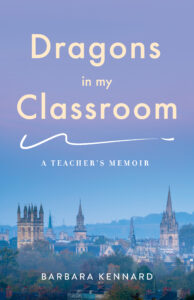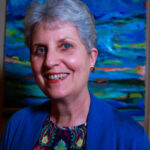 Writer Barbara Kennard is here today and we’re chatting about her spiritual memoir, Dragons in My Classroom, A Teacher’s Memoir.
Writer Barbara Kennard is here today and we’re chatting about her spiritual memoir, Dragons in My Classroom, A Teacher’s Memoir.
Bio:
Barbara Kennard was born and raised in Montclair, New Jersey. She holds an AMI degree (Association Montessori International) from the Montessori Center of New Jersey where she trained with one of Maria Montessori’s students and a double master’s degree in Special Education and Clinical Child Development from Pacific Oaks College. She completed her undergraduate degree and California State Teaching Certification at Occidental College. Barbara taught English and performing arts to elementary, middle and high school students from 1980-2015 in a variety of settings: public, private, nonsectarian, sectarian, special needs, suburban, rural and inner city.
She has received two teaching awards: The Christa McAuliffe Award for Teaching Excellence (1999) and The Barbara Kennard Sixth Grade English Prize (1995), established in her name at The Fessenden School by a Fessenden family. Her poetry has been published in the United States and in the United Kingdom: Boomerang: a UK Online Poetry Journal, The New Writer (UK), The Anglican Theological Review ( USA) Time of Singing (USA) and Teacher’s Forum, a Milton Academy Publication (USA). Barbara is a member of the Fellowship of St. John, a community of lay women and men around the world who strive to live the Rule of Life followed by the Brothers of The Society of St. John the Evangelist in Cambridge, MA.
Barbara enjoys gardening, swimming, reading theology, cooking, and volunteering for mission and outreach programs and participating in Adult Formation at her church. She has lived in California, New York, New Jersey, Massachusetts and Oxford, England, but now resides in Texas with her husband, pianist, Brady Millican, and their cat, Piper.
Welcome, Barbara. Please tell us about your current release.
My book, Dragons in My Classroom, A Teacher’s Memoir recounts the year I spent teaching at the Dragon School in Oxford, England. The experience enabled me to address the perfectionism that was holding me back from being the teacher I’d always wanted to be. My book is about having the courage to face our flaws and finding ways to be better at what we do without being a perfectionist. It’s about how we can discover that our best is good enough We don’t need to be perfect. It’s a story of empowerment, hope and the beauty of reinventing oneself.
What inspired you to write this book?
Teaching overseas for a year in Oxford England was a life changing experience for me. It enabled me to start over, to have the chance to begin again in order to become the teacher I’d wanted to be since I was in first grade. To do this I had to find ways to address my perfectionism and the unreasonable expectations I had for myself and my students. In order to stay in this profession, I had put aside everything I knew about teaching in the US and learn to do it the UK way.
Excerpt from Dragons in My Classroom, A Teacher’s Memoir:
From Introduction
I knew I wanted to be a teacher in 1959, when I was six years old. Miss Gluding, my first-grade teacher, was kind and firm. There was no dilly-dallying around with her. She instilled in me a small, healthy sense of fear and a large dose of compassion. Today, we cringe at the idea of a teacher making students feel a little fearful, but it actually helped me learn. I knew from her eagle eye that she meant business when I fooled around in class, but I also felt her compassion for me when I struggled to read. I can still see her sitting next to me in the hallway outside her classroom, our chairs side by side, her small, gray-haired head bent over, watching and listening to me with all her attention, as I read aloud from Our New Friends, one of the many titles in the Dick and Jane series.
I read fast and with mistakes. But Miss Gluding said gently, with a twinkle in her other eye, “Oops, Barbara, one whole line skipped right out off the page. Where did it go? Let’s try again with this index card. When you keep your place, you read very well.”
My mistakes frustrated me, and the fact that I was born almost completely blind in my right eye was no excuse, as far as I was concerned. I worked at something until I got it right. I reasoned, I may not have much vision in my right eye, but I will strive to be perfect in other ways.
Miss Gluding was a saint with me. When I grew impatient with myself, she smiled and encouraged me not to give up. She never asked me to “get it all right”; she offered me strategies and asked me to try again. I wanted to be a teacher, like Miss Gluding.
I started very early on my journey toward perfection and never gave up trying to compensate for my poor eyesight and dyslexia, which no one knew anything about, let alone the word itself, when I was in school. Other teachers, who didn’t have Miss Gluding’s empathy, embarrassed me by calling attention to my mistakes. I remember the terrible humiliation I felt from my sixth-grade teacher’s words when I couldn’t spell correctly. “Barbara,” Miss Bell announced for the whole class to hear, “You have not spelled fascination correctly. Once again, you have reversed the c and the s. You will not be able to read and write very well next year in seventh grade if you cannot spell correctly. Copy it twenty-five times at recess.”
I wiped my eyes. I loved to read and write and couldn’t wait to be in seventh grade. I copied fascination twenty-five times in my best Palmer cursive.
Whenever Miss Bell made me feel bad about my spelling, I tried to recall kind and strong Miss Gluding, and what she had written on my report card: “Barbara is a very good reader.” But because of my painful sixth-grade year, I decided instead that when I became a teacher, I wouldn’t yell at a kid for misspelling a word like fascination, or make her stay in from recess to copy it twenty-five times. I would be a better teacher than Miss Bell.
What exciting story are you working on next?
I’m writing a book about teaching Shakespeare. Working title: Students Do Shakespeare in Measure, Time and Place: and a memoir about growing up with my Uncle Ted who was severely brain damaged from birth.
When did you first consider yourself a writer?
When I was about 10 years old. I preferred to write stories and poems rather than do my math homework.
 Do you write full-time? If so, what’s your work day like? If not, what do you do other than write and how do you find time to write?
Do you write full-time? If so, what’s your work day like? If not, what do you do other than write and how do you find time to write?
I write full time now as I am retired from teaching. I write every day except Saturdays and Sundays, I save those for my family. Generally, I rise at 6 am, make a cup of tea and go to my study where I have a small prayer space. I start the day with 20 minutes of silence to give thanks for a good night’s sleep and for another day. Then I sit and listen to whatever I need to hear. After my quiet time, my husband and I have breakfast. He practices his piano and I get dressed and return to my study to write for several hours. We take a break around 10:00 and go to the gym, or take a walk and return to our respective activities. At 1:00 we have lunch. Sometimes I do some work around the house or run a few errands before returning to my work for another round of writing for several hours and cap it off with another session of silence. We make dinner together. After dinner, we either listen to music, talk with friends or family on the phone, or read. I don’t do any writing after 5 o’clock; otherwise I end up taking it to bed with me, which I don’t like to do! I retire at 10:00 and am blessed to get 8 hours every night.
What would you say is your interesting writing quirk?
I let our cat Piper sit on my desk while I write.
As a child, what did you want to be when you grew up?
A teacher
